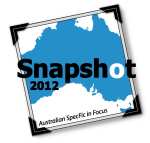 WEST Australian Peter Docker studied writing at Curtin University of Technology and acting at the Victorian College of the Arts in Melbourne. His fiction credits include Fremantle Press novels Someone Else’s Country (2005) and Aurealis Award nominee for best science fiction novel The Waterboys (2011) (review) and short story collection The Kid on the Karaoke Stage (2011), one-act play A Million Miles from Ulcer Gulch and radio play Marrying My Family (1995). He has outback revenge thriller Sweet One, YA illustrated comedy Toecutters and autobiographical TLC (The Love of Country) in the works.
WEST Australian Peter Docker studied writing at Curtin University of Technology and acting at the Victorian College of the Arts in Melbourne. His fiction credits include Fremantle Press novels Someone Else’s Country (2005) and Aurealis Award nominee for best science fiction novel The Waterboys (2011) (review) and short story collection The Kid on the Karaoke Stage (2011), one-act play A Million Miles from Ulcer Gulch and radio play Marrying My Family (1995). He has outback revenge thriller Sweet One, YA illustrated comedy Toecutters and autobiographical TLC (The Love of Country) in the works.
Does setting a story such as The Waterboys in the future and the alternate past allow you to discuss topics more freely than a contemporary story?
The trouble with white Australia is that we’re not black enough. With Waterboys I went searching for answers, which led me simultaneously to the past and the future (no doubt influenced by my rudimentary understanding of the only true Australian expression of spirituality -– The Dreaming –- which is a place/time/situation existing simultaneously in the past, present, and future). This certainly gave me the freedom to explore themes like the inevitable failure of democracy, and the ultimate outcomes of ‘constant growth’-based capitalism on the land, and the peoples whose entire material and spiritual existence is tied to that land. I am constantly searching for grand metaphors to discuss the soul of our nation.
The Waterboys, as well as being a study in race relations, depicts a future where water is a scarce resource. Are these themes likely to recur in your work?
In some ways it’s a great irony to me that, on the eve of publication of Waterboys, eastern Australia was experiencing the worst flooding in a hundred years. The secret of timing is comedy. My forthcoming work Sweet One is set against the background of the mining industry and the undeclared on-going secret war that the states are waging against the traditional owners.
In what ways has your background in acting helped or influenced your writing?
The vast majority of my acting work (once I got away from Neighbours and Blue Heelers) has been on Aboriginal projects -– in many ways they are like research tours. I certainly use acting techniques in my writing. For example, a great acting dictum is ‘give the problem to the character’. When a plot point or character illumination issue arises, I allow the problem to be solved by the character and not the writer. This means that I often don’t know which way the character will jump until I get that pen in my fist and give the character power over my hand. I also use filmic techniques to avoid the very tricky issue of me putting thoughts into the heads of my indigenous characters. I report dialogue but the inner workings are left to the reader. This also allows the reader to realise that I am no expert in Aboriginal people or cultures, although I do know something about what happens when we come together.
What Australian works have you loved recently?
5. The Biggest Estate on Earth by Bill Gammage is a meticulously researched game changer for everything Europeans have ever thought about pre-Cook Australia. Carpentaria by Alexis Wright is an Australian War & Peace, or Great Expectations. And That Deadman Dance by Kim Scott: the layering in Kim’s work is mind blowing. He takes us into a profound emotional place in such a subtle way that we are deep inside the emotional and spiritual system without quite realising how we got there.
What have been some of the biggest changes in Australian speculative fiction in the past two years?
We are a new country with an emerging culture and the spec fic we produce reflects this. It is no coincidence that as we mature the literature from here is finding a bigger international audience. The rawness of Aussie lit compared to nations with much longer histories and traditions than ours seems to be part of the appeal. I particularly like the way that brilliant writers like John Birmingham do not confine themselves to just writing about Australia (unlike yours truly) but are capable of taking on massive issues like the end of America.
THIS interview was conducted as part of the 2012 Snapshot of Australian Speculative Fiction. We’re blogging interviews from 1-8 June and archiving them at Australian Speculative Fiction in Focus. You can read interviews at:
